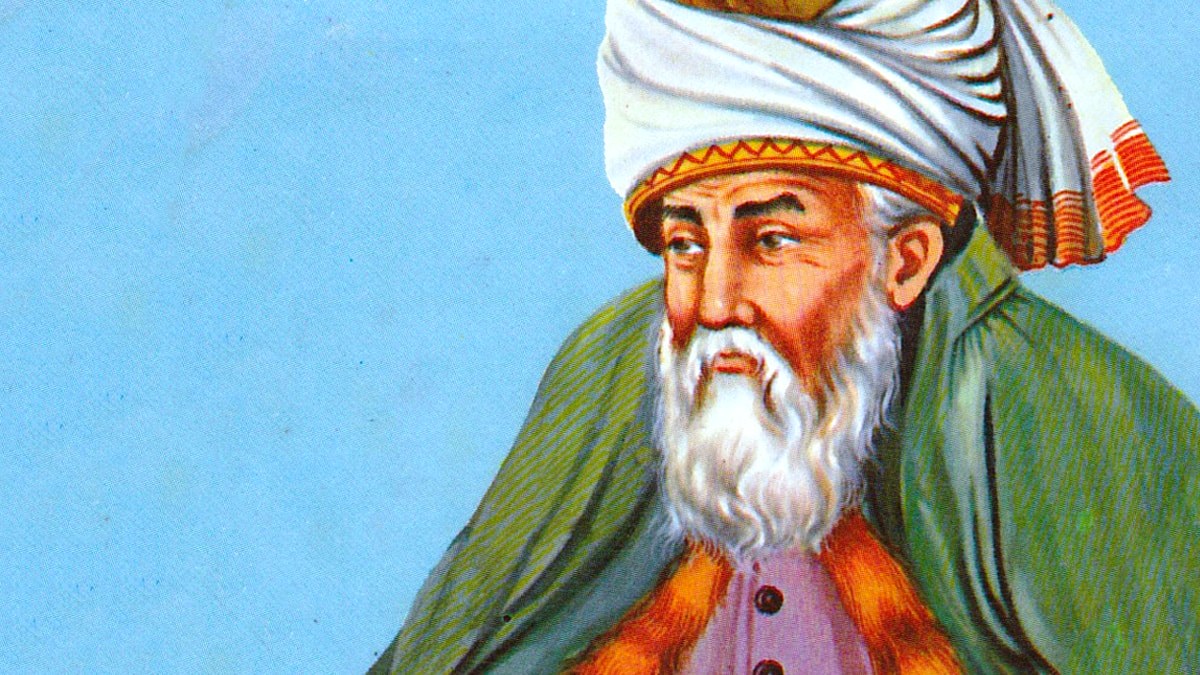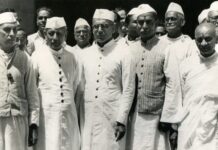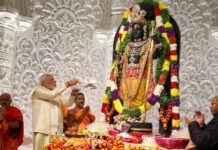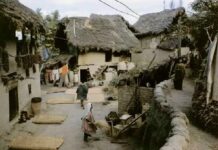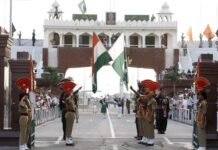In July 1846, almost four months after British sold Kashmir to Gulab Singh, a Kashmiri nobleman Ahmed Shah Nakshahbandi submitted his assignment to Lord Elphinstone. He had been tasked to write a travelogue to Yarkand, then major trading partner of Kashmir, which he had visited earlier. The significance of the travelogue, offering an aspect of those good old days when Kashmir lived freely in the region is now a dream that politicians are chasing in a new political geography

Merchants going from the city of Kashmir to Ladakh usually carry with them coin, as Mohammed shahi rupees, or silver bullion, as the yambo (sycce silver), or bills, for the purchase of green tea and shawl wool. For the expences of the road and the disbursements in Ladakh, they take broad-cloth, saffron, paper, cottons (both coloured and white), tin thimbles, needles, lack, wax, tobacco, and other articles. For their food they carry with them from Kashmir rice, talkan (linseed) cakes or biscuits, and butter. On all these things a duty is levied at the custom-house, and the traders receive a pass from the Darogha, which clears the several stations and ferries on the road.
They leave the city on the north by the Mahal of Naushehra, and proceed to Gandarbal, about five kos distant, where they receive a passport, agreeably to the practice of former times. On returning from Ladakh with teas and shawl wool, they stay here several days collecting their packages, when they have done which, they announce their arrival to the Darogha. This officer, with the head of the merchants of Ladakh, then repairs to the place, and they pass some time in mutual entertainments, in consequence of which the place has for a long time become the site of a bazar.
Since the time of Ranjit Sing, however, the packages are taken on to the city, and the duty is there levied. At the distance of three kos from Gandarbal travelers come to the banks of the Sind river, on both sides of which runs the road, through a cultivated tract mixed with jungle. When they take the right hand of the river, they generally rest at the station of Akhal; and when they proceed along the left, after crossing the bridge, they come to the place termed Kangan, where they pass the night.
On the second night they arrive at Gandi Sar Sing the house of Malik Abdur Rasul. It was formerly the custom to pay rahdari or toll to the Malik, who was originally a soldier in the service of the former kings, and a manusabdar (fief-holder) and hakim of Ladakh, as which his ancestors have held a jaghir for several generations in Kashmir. From Gandarbal to Ladakh his authority is recognised, and whatever he writes to the Raja of Ladakh is complied with. It was his duty to provide porterage for goods as far as the village of Sonamarg, through the valley named Narahwao.
The inhabitants of this valley are all carriers, and, under the orders and authority of the Malik, supply the merchants with the means of conveying their goods, which are carried sometimes by men and sometimes by horses, under the command of the Malik, from the city (of Kashmir) to the town of Dras.
In winter the packages cannot be conveyed by horses, on account of the difficulties of the Zojah Bal Pass, and are therefore carried by men only. From the city of Kashmir to Ladakh, if the conveyance be by means of men only, the goods arrive safely in a month or a little more; but the porters of Narahwao frequently carry the goods as far as Dras, and there give them over to the landholders of that place, who are dependent on the Ladakh government, and they convey them the remainder of the distance on horses. The duty of conveying goods to Ladakh, and of bringing them from thence, was always under the charge and trust of the above-named Malik; but since the appointment of Zorawar Sing to the government of Ladakh by Ranjit Sing, the ancient usages have been abolished, the Malik has been deprived of his jaghir, a thana has been established at his dwelling, and such new regulations introduced as the governor thinks fit.
From the village of Gundi Sar Sing, the road passes along a valley, through which the river Sind flows, and which is part cultivated and part jungle. Having proceeded about three kos, and crossed over a bridge, the village of Gangana-gir on the other side of the river, is reached. In this place the first of the Kashmir custom-houses is situated, and the inhabitants number about fifteen houses. They are all employed in the service of the customs, as writers, clerks, and messengers to the city. They are charged with the duty of examining the miscellaneous goods of the merchants, but the closed and covered packages are carried on to the custom-house at the city. From this place the road proceeds on the right bank of the river Sind, through a valley covered with jungle and rocks. At about the distance of a kos, a place is reached which the people of Kashmir call Hank. This is a rocky place, with hills all around, and beneath it the river flows with a very rapid current. Here, on account of the many difficulties of the road, the loads are taken off the horses, and are carried by men to the village of Sonamarg. The lands and the hills around this place are covered with perpetual verdure, and the roses, water, and temperature are all most delightful; it has therefore been called Sonamarg, or “the golden plateau”; marg, in the language of Kashmir, meaning a space at the top of a hill.

From Sonamarg to the entrance of the Zojah Bal Pass the distance is three kos, the road passing through a waste country, well supplied with water and vegetation, and having a delightful air. At one or two places in this part of the road a capacious inn or caravanserai has been built, as a protection for travellers against the snow and cold which in winter are very severe, and in these houses travellers sometimes take rest and refuge. The place where these houses are built is called Rangah.
From hence to the pass of Zojah Bal the distance is about two miles. It is often necessary to make a halt in the pass, and as there are no inhabitants there, a capacious house has been built on the skirts of the pass. This building is constructed of stone and logs, and is made very strong to resist the weight of the snow which falls upon it from the mountains above: the house is called Mar. It frequently happens that travellers and caravans become entangled in the pass, and are unable to get through, especially in winter, when the snow is deep; on such occasions they take shelter in this building until they can proceed.
The snow, however, is sometimes so deep that they are unable either to go on or return, and are consequently compelled to remain in this house, where they suffer much privation and alarm. There are two roads through the pass: one is practicable in summer only; the other, which passes through a narrow valley, is the one always pursued in winter. This valley is sometimes in winter filled with snow which falls down the sides of the hills, as if through troughs or spouts. In winter, persons passing through the pass, have great dread of the wind and snow.
After emerging from the pass, the traveller arrives towards evening at the village of Matayan which is the first inhabited place in the Ladakh territory, and from ancient times formed part of the jaghir of the Malik. In the course of the journey from the pass, an extensive lake is found in the low ground, which in appearance is tranquil, and has no current. The river Sind, which runs by the valley of Narahwao to Kashmir, here takes its rise, and half the waters flow off by that channel; the remainder flows towards Ladakh and Iskardu. The distance from the pass to Matayan is two stages, through a country rich in water and pasture, to which in summer the herdsmen and shepherds of Kashmir bring their horses, sheep, and other animals for the purpose of grazing.
From Matayan the road passes to Pandras and from thence to the town of Dras. The mountains are situated only a short distance from these places; but nevertheless there are some extensive valleys rich in vegetation, which are much resorted to by herdsmen and graziers, because horses and other quadrupeds fatten there without corn of any kind. At this place there is a road leading towards Iskardu, by which the men of that country sometimes approach, making forays, and driving away the cattle. The government of the town of Dras is shared by the Malik of Kashmir and the Raja of Tibet.
There are two roads from Dras, one through the Pass of Pirana Wari to the village of Karchu, from thence to Sor and then to Pashkam – the other, without any pass, direct to Pashkam. The distance is five stages, in the course of which there are some villages and cultivated spots which are dependent on Ladakh. In Pashkam there is a custom-house, where they levy duties on the goods and property of the merchants for the Raja of Ladakh. From this place to the frontier of Iskardu is three days’ journey, over a rugged stony country, where it is impossible for strangers to travel without unshod Tibetan horses. The Tibetans, however, do not take off the shoes of their horses, but travel with them shod as usual.

The next place is the village of Malbu. Here also there is a Raja kalan minister, and tolls are taken from the merchants. From Malbu to Lamayaru the distance is four stages. In this place there is a Tibetan temple or monastery, the inhabitants of which are all lamas or priests, professing and teaching the Tibetan religion and laws. Women are also received into the sacred order. The male priests are called Lamas, and the women Chomal.
At the distance of one stage from Lamayaru lies the village of Khalchi, close to which flows the large river from Ladakh towards lskardu. A strong and substantial bridge is here built over the river. In former times no toll was levied from the merchants who came from Ladakh with green tea and shawl wool; but ten or twenty years ago Khajah Muhassin Ali, a chief of the Shia sect, and a banker at Ladakh, imposed a duty in the name of the raja, amounting to one rupee on each dom or block of tea, and one rupee on each package of shawl wool; and from his time to the present the toll has been regularly levied. When the toll has been paid, a pass, called lamek in the language of Tibet, is given to the merchants, upon examining which, and finding it to agree with the merchandize, the custom officers of Khalchi allow the goods to pass over the bridge; but if there be any discrepancy, the goods are detained until an order for their being passed is received from Ladakh.
The next village is called Nurullah, where, as at Khalchi, apricots and apples are abundant. From Nurullah the road passes to Saspul, and from thence to Bazkoh. Here there is a thanadar, who levies a small toll. Starting from hence, the traveller reaches at night the city of Ladakh.
Ladakh is a city much frequented by merchants; it is for the most part surrounded by mountains, and what level ground there is near it is stony and sandy. The temperature is very cold, and the land abounds so much with rough stones, that they are collected and arranged in piles to form the boundaries of the fields. Notwithstanding this, the sandy plain is cultivated with barley and wheat.
Rice and other grains, with butter and meat, are brought with much labour from adjacent parts. Wheat, barley, grass, and fodder grow in the surrounding districts. The fodder is of a peculiar kind, which grows also in Turkistan and Kabul – in Turkistan it is called “bidah ponchakah,” in Kabul “ziskah,” and in Ladakh “jahanob.”
It is a very excellent food for horses, and they become fat upon it in the course of twenty days or a month without any corn. The mutton of Ladakh is very good, but scarce. The sheep which are employed as beasts of burden to bring the shawl wool from Ladakh and the surrounding parts are large and strong, but their flesh is not good, and never becomes tender by cooking; but it is sometimes minced or hashed, and may then be eaten. The water of Ladakh is rather unwholesome. The trade and commerce of the place is chiefly carried on by natives of Kashmir, and consists principally of cloths, morocco leather, embroidered cloths, and silks, which are brought from Zanskar, or by people of the Panjab from Nurpur and other places, and sold to the merchants of Yarkand. Besides the raja and the kalun, who is his deputy or minister, no one possesses any authority.
Among the merchants of Kashmir there has been from old times a dalal, or broker, without whose inspection no trading transaction, whether small or great, can be carried on, and he receives a regular commission or brokerage on the sales. The merchants who import tea from Lassa call it chabah, and it is not the custom for them to sell it to anyone except the shamul or common broker. The merchants who import shawl wool bring it from Radakh, Chan-tan, and parts adjacent, sometimes even from Yarkand, it having been collected in the towns of Khotan. This shawl wool also is not bought or sold without the inspection of the shamul broker. Some dealers purchase the shawl wool in the rough un-cleaned state, good and bad together; they then separate it from a large quantity of hair which is mixed with it, and after sorting it into different qualities and cleaning it, they make it into packages, and export it at the proper season, by means of hired porters, to Kashmir.
The green tea is bought in the same way as the chabah. It is brought in blocks called dom, which are packed in cow-skins. These packages are called charghannah; when they arrive, they are taken home, where the skins are undone, and the tea assorted into various qualities.
The packages are again made up in various sizes, according to the season of the year, being lighter in winter and heavier in summer, and the skins being then put over them again, the charghannahs or packages are forwarded to Kashmir.
In Ladakh there are no rupees nor copper coins, but there is a thin silver coin called a jao, which is equal in value to a quarter of a rupee, and is current as such, four being reckoned as a rupee. These coins bear on one side a legend, importing that they are struck at Tibet, and something more in Tibetan letters, and on the other side the name of the raja who was established on the throne in the time of Mahmud Shah. A yambo, or bar of sycee silver, is equal to 50 pals of pure silver, and passes current for 180 rupees.
Merchants who intend going on to Yarkand remain in Ladakh a sufficient time to bring their horses into condition. Before setting out, they provide a stock of food and other necessaries, sufficient in quantity to supply both men and horses for a period of forty days.
If two horses are employed in carrying merchandize, three are required to carry the food; and if ten be laden with goods, there must be fifteen to carry provisions. An equal number of servants, men of Ladakh or Yarkand, is necessary to look after the horses and baggage; without these the journey cannot be performed.
The traveller, on setting out from Ladakh on his way to Yarkand, proceeds in a southern direction, and at the distance of three kos reaches the village of Sabu, which is the first resting-place. Near to this village the road proceeds through a very elevated pass, the passage of which occupies one day of great toil. The ascent is here so steep, that horses cannot carry the baggage, and the merchants are consequently obliged to engage some men of Ladakh, who convey the goods through the pass on the back of a species of cow called yak. Having effected the passage over the mountains, a village called Digar is reached, which is the next halting-place. The people of Sabu call this pass Koh i Sabu (the mountains of Sabu), and the people of these mountains arc called Digar.
After quitting Digar, the traveller next arrives at the village of Akhkam, which is the last inhabited place of Ladakh; and a short distance farther the road reaches the river Shayuk, which rises in the Muzdawan or Icy Mountains, near Sasir. For five stages onwards the road passes through a very stony country, possessing a little jungle. The river is crossed several times every day. A place called Lama kinti which is a village dependant on Ladakh, but containing only a few inhabitants, is then reached. This place is situated on an eminence, by the side of the river.
When the caravans arrive here from Yarkand, the travellers experience great pleasure, from their near approach to an inhabited and cultivated country, and they remain one or two days to rest from the fatigues of their journey.
Setting out from hence towards Yarkand, the village called Chong jangal, i.e. “great jungle” is next reached; and from this place to the pass of Karah karam, the distance is about ten stages. The road during these ten days’ journey passes for the most part through a stony plain, and every person is constantly occupied in looking to the shoes of the horses, and in keeping the animals shod. Throughout the whole of the distance there is very little jungle, and wood is very scarce. There is found in some parts a species of shrub called burchah, the roots of which are torn up and used for fuel, whether wet or dry: continual search is made for this product.
This is the great road to Yarkand, and travellers generally pursue this route when there are no inundations, especially in the winter season; but in the summertime, when the waters overflow, they pursue a different route through the Nobra.
Providing themselves with a sufficient number of stout men and horses, they set out from Ladakh towards the north, and pass over some high mountains, called Kardong. Their baggage is conveyed over these mountains by yaks, belonging to carriers hired in the city. The first night they reach a place called Kunalas, and on the second day, having effected the passage over the mountains, they reach the village of Kardong. Three stages from hence they enter the Nobra country, the villages and cultivation of which, and the fruits, apricots, water, and air, are all superior to these of Ladakh.
After two days’ journey, a village named Hindal is reached, near to which there is a great road leading to lskardu. Having rested here from the fatigues of the journey, and having proceeded two stages farther, the traveller reaches the mountains of Kardwal dawan.
These mountains attain a very considerable altitude, and travellers about to cross over them start before break of day. After encountering numberless difficulties, and enduring great fatigue, they effect the passage ere night sets in. It is customary here, whenever a caravan arrives from Yarkand, that, for the purpose of assisting the merchants, one or two men of Nobra go out upon the mountains, and kindle as many large fires as there are merchants in the caravan. Notwithstanding the distance of five or six stages between this place and Ladakh, the fires are descried from the residence of the raja, which is situated on an eminence. Carriers are then sent out to meet the merchants, and to assist them on the road.
After crossing the mountains of Kardwal dawan, the road for two stages lies through a mountainous country, in which no wood can be procured except the burchah. The river Sasir, which rises near the Muzduran, or Icy Mountains, is sometimes very much swollen, and flows with a very rapid and turbulent course; heavy clouds also gather round: on such occasions travellers wait upon the banks, and as the source of the river is very near at hand, the waters gradually subside, and the travellers pass over securely. Two stages after crossing this river, the road unites with the great route to Yarkand, near Kara karam.
From the village of Akhkdm to the village of Karah karam the ground passed over by the great road gradually rises. The mountains at the latter place are not very high or steep, but their elevation at the base is very considerable. In winter the atmosphere at this place is exceedingly impure so much so, that from its influence, and the scarcity of water, strong well-conditioned horses will fall down suddenly and die. The carriers also suffer from it, but its effect upon the human constitution is not so rapid, and some experience no ill effects from its influence. As a means of averting the effects of the noxious air, it is usual during these two stages to abstain from flesh and butter; and, indeed, the taste becomes so vitiated that bitter or sour food is preferred. For three or four stages on both sides of Karah karam the country is entirely destitute of wood – there is not even any of the burchah to be found; it is consequently necessary to carry the fuel required for these two or three days on horses. In winter, when the frost prevails, there is also a great scarcity of water, and horses frequently fall, and die of thirst.
From Karah karam to Kazil tagh or the Red Mountain, and from thence to Ak tagh, is a stage. A place called Malik Shah is next reached; there is a spring of water here, and fodder is procurable; so that food and drink can be given to the horses, and travellers are relieved from the fear of losing them by death. From hence to Kirghiz jangal, which contains abundance of wood, the road passes through a valley, which is in some parts wide in extent, and in others more confined by the hills; the mountains, however, are never very distant. Travelling onwards till night a place called Kalan uldi is reached, where there is plenty of wood, fodder, and water. In this stage there is a road leading to Sarikul, by which the Kirghiz Tatars have approached, since ten or twenty years past, on plundering expeditions, causing great alarm to caravans as they pass along: the road was formerly secure from these attacks. When the baggage horses die through the impurity of the atmosphere in the vicinity of Karah karam, the merchants leave their loads by the side of the road and go on contentedly to Yarkand. When they arrive there, they send out men and horses, who bring in the property. It is only at this part that travellers are thus obliged to abandon their baggage, for in other places some means of transport are found, and they continue their journey.
Having left Kalan uldi, travellers next reach Yangi dawan or the New Mountain; and continuing onwards for two or three stages through a mountainous country, well supplied with grass and fodder, arrive at the tomb of Saiyad Jalal ud din; but they often go on beyond this place before making a halt. For the distance of two stages onwards the road proceeds through a narrow valley, in the midst of which flows a river. The baggage is generally carried through the river by the horses, which is a work of some difficulty; and when the waters are high, the goods sometimes get wetted.
This river is crossed several times in the course of the next two days’ journey.
Khalastan, which is the next stage, is a village situated on the banks of the river and surrounded with plenty of jungle. There are some Wakhanis living in the hills near this place, who are the only people of that race in the confines of Yarkand. Travellers with the caravans, when they arrive here, go to these Wakhanis, and procure from them sheep, butter, milk, curds, grain, and for this purpose they sometimes remain there one or two days.
From this place, the road proceeds to the mountain called Topah dawdn or Mountain of Earth, which consists merely of dirt. Travellers passing over it keep carefully to the beaten road, for the dirt moves about like a stream of water.
Starting from hence and travelling till night, the traveller reaches Kokiar which is the first inhabited place of Yarkand. A Chinese customs officer and guard are stationed here. It has long been the practice at this place that the Chinese porters carry all the packages and miscellaneous articles of the merchants to the custom-house as soon as they arrive, and there secure them. On the next day a small piece of paper, with writing upon it, is stuck upon the outside of the closed bags or packages, near the opening, instead of a seal. An account is then drawn out in the name of the traveller, and a catalogue is made of all the miscellaneous articles; the goods are then given over to the owners. On the second day two horsemen are sent on with the caravan to Yarkand, and in three days they arrive at the city, when the goods are deposited in the custom-house, according to the account sent with them.
Here, according to old established custom, they levy at the rate of 40 percent from traders of Hindustan and Kashmir, and at the rate of 30 percent, from these of Bokhara, Andajan, Badakshan, and other places. Jewels and precious stones were formerly allowed to pass without notice, but for some years past, in consequence of the disturbances in Kokan, these are delivered up to the customs officers of the Chinese Emperor. They convey them on to the city, according to established practice, and deliver them over to the hakim, and ho afterwards restores them, packed up, to the owners.
Rules of the Government of the Emperor of China
The Emperor of China appoints the governor of the city, who is a Chinese and is called Amban. Troops are placed under his command, who are supported by monthly pay, and whom he employs in the affairs of government, and in watching the treasury and gates of the city. The customs, tribute, and the grain of the Khaniyah or state lands are committed to his charge. The government grain is brought into the granaries every year by the labourers of the hakim; and the different kinds of grain are then changed for wheat, which is the only grain stored in the public granaries. Whenever the grain is damaged or injured, it is immediately sold in the markets at a low price, and good sound wheat bought in its stead; whatever loss is sustained in the transaction is borne by the government.
The government also appoints a Mussulman governor or magistrate, called Hakim, distinct from the Amban. The administration of justice in the city, the collection of the customs, tribute, and government grain, and the keeping of the registers, or accounts of the city, are the duties of the Amban. There is no interference of any kind with the religion of the Mahomedans. The Kazi of the city holds a very high station, and his orders are treated with the greatest respect.
The Ulamas, or learned Mahomedans, are treated with much honour and regard. Whenever a dispute arises between a Mahomedan and a Chinese, it is settled according to the Mahomedan law. The Chinese also are sent to the Hakim, and he, with common consent, settles their disputes by Mahomedan law. The law is very rigidly administered, even to the nobles; so much so, that if a prince were to kill a poor man, the murderer would on no account be exempted from the punishment of death.
Criminals are seldom imprisoned, but the punishment usually inflicted is of the following kind. A collar of wood, about a guz square, divided into two halves, made to open and shut, and having a hole through the centre, of the size of a man’s neck, is fastened round the neck of the criminal; and he is compelled to wear it for two, three, or six months, according to the nature of his crime. These sentenced to this punishment are frequently stationed in the bazars, so that they may serve as a warning to others. At different parts of the bazars there are holes dug, for the purpose of enabling the persons wearing the collars to sit down and rest. When they feel tired or sleepy, they get into these holes, and rest the collar on the surface of the ground; and in this position, they rest and sleep.
In other places in the bazars seats are built up, and men may daily be seen sitting in them. Quarrels are of frequent occurrence in the bazars, but no notice is taken of abusive language; if, however, blows are given, either with the hand or weapons, the person who struck the first blow is seized, and, under the orders of the Hakim, he is subjected to the punishment of the collar; because all men are considered equal before the Hakim, and the right of inflicting blows or imprisonment belongs to him alone.

Corporal punishment is inflicted with a stout stick, about a palm in width, shaved flat, and having a handle at one end. The criminal is thrown down upon his belly, and two men hold him firmly by his head and feet: a prescribed number of blows, according to the nature of the offence, is then inflicted. Women and armed men are not allowed to leave their native country. There are two tribes or classes of people in China, the Kara Khatais (black Chinese), and the Manchus. The emperor is of the Manchu race; consequently, whenever a Manchu is sentenced to corporal punishment in any city of China, a carpet is spread upon the ground, on which he is thrown down and beaten. The Kara Khatais are beaten in an ordinary manner. On the first three days of each month the troops are exercised, and the pay is then distributed. The fourth part of each man’s pay is deducted, and retained by the Amban as a deposit: whenever the soldier is removed, or goes away, the Amban renders an account of it, and pays it over. The troops are not allowed to retain their muskets and swords except on drill days. The officers and soldiers, whether abroad or at home, do not cook their own food: in towns, there are markets where it is bought, and in camps, a bazaar is established for every thousand men.
At the beginning of every month the Amban, the Hakim, the nobles, and all the officers in the pay of the government, go early in the morning to the temple and prostrate themselves. On the walls, in the interior of the temple, there is a large painting, representing the council of the King, with his ministers and nobles, to which they bow down. The Hakim also goes occasionally to pay his respects to the Amban, especially when any important affair happens in the city.
The shopkeepers, artisans, and cotton-weavers of the city, as also weavers in the country, are exempt from tax and tribute; and from the shops and lauds of the city, nothing is regularly levied. The artisans, however, are compelled to work at stated periods for the government; but instead of exacting this daily labour, the value of it is settled, and collected from them. A poll-tax, called Alban, amounting to ten or fifteen rupees, is collected from the ryots, excepting religious and learned men, for defraying the expences of the officers employed in the ortang, or post-office, and the charges of its transit.
The cultivated lands in the villages are of two kinds; one called khaniyab lands, of which half of the produce is regularly taken by the government. Whenever the Hakim bestows any of these lands in jaghir to learned or religious men, no tribute is taken. From those who hold the zar kharid, or purchased lands, 10 percent, is regularly collected. The collection of the land revenue is under the exclusive control of the Hakim; and the Amban has no right of interference, either in collecting or remitting.
Coins
The coins of China are square, and are made of copper or brass, and have a square hole made through the centre. They are struck in the chief cities. On one side there is a legend, in the Chinese language and character, and, on the other, the name of the city where the coin is struck; as, for instance, that of Pechin, which is the name of the capital, and seat of government of the Emperor. In Pechin, they are made of brass and are current throughout the empire. In other cities, they are made of copper. The fulus, or small coins, are called pal; fifty of them make a tanga, which is about equal to a rupee. In trading transactions, the money is paid in tangas, which are strung upon a cord about three spans long.
If twenty tangas are to be paid, two strings are given; if a hundred, five; and so on, the traders confidently receiving the strings without troubling themselves to count the coins. There are no gold or silver coins in the country, but pure silver is made up into lumps of the weight of fifty pals, called yambo, some of which have marks and letters stamped upon them.
The halves and quarters of the yambo, and even so low as the proportion of a single pal, are made, and pass current in trade. Pieces of silver also, not forming parts of a yambo, pass current simply by weight.
In the city of Kokan gold, silver, and copper coins are struck: one gold coin is equal to twenty-two tangas of silver; and the silver tanga to forty small fulus made of copper. These coins are all generally current.



